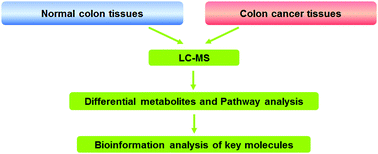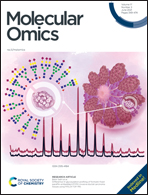Tissue metabolic profiling reveals major metabolic alteration in colorectal cancer†
Abstract
Metabolic reprogramming is a hallmark of cancer, which is still far from being fully understood in colorectal cancer. In order to characterize the metabolic changes in colorectal cancer, we performed metabolomics analysis of paired colon tissues from colorectal cancer patients by using a liquid chromatography–mass spectrometry (LC-MS)-based method. Bioinformation analysis was used to define important metabolites and metabolic pathways, as well as the prognosis significance and expression levels of the key molecules. The results indicated that the metabolite phenotype in cancerous colon tissues was obviously different from their normal counterpart, and we identified a series of important metabolic changes in colorectal cancer, including decreased trends of glucose, citrate, serotonin, 5-hydroxytryptophol and 5-hydroxyindoleacetate, as well as increased trends of glutamate, glutathione, creatine, proline, lactate, fructose 1,6-bisphosphate, succinate, tryptophan, kynurenine and long chain acyl-carnitines. These metabolites are mainly implicated in energy metabolism, amino acid metabolism, glutathione metabolism and fatty acid metabolism. In addition, we found that the expression levels of several key molecules in these pathways were closely correlated with the prognosis of colorectal cancer patients. This study characterizes the metabolic profile in colorectal cancer tissues and provides more insightful understanding of the metabolic reprogramming of colorectal cancer.



 Please wait while we load your content...
Please wait while we load your content...